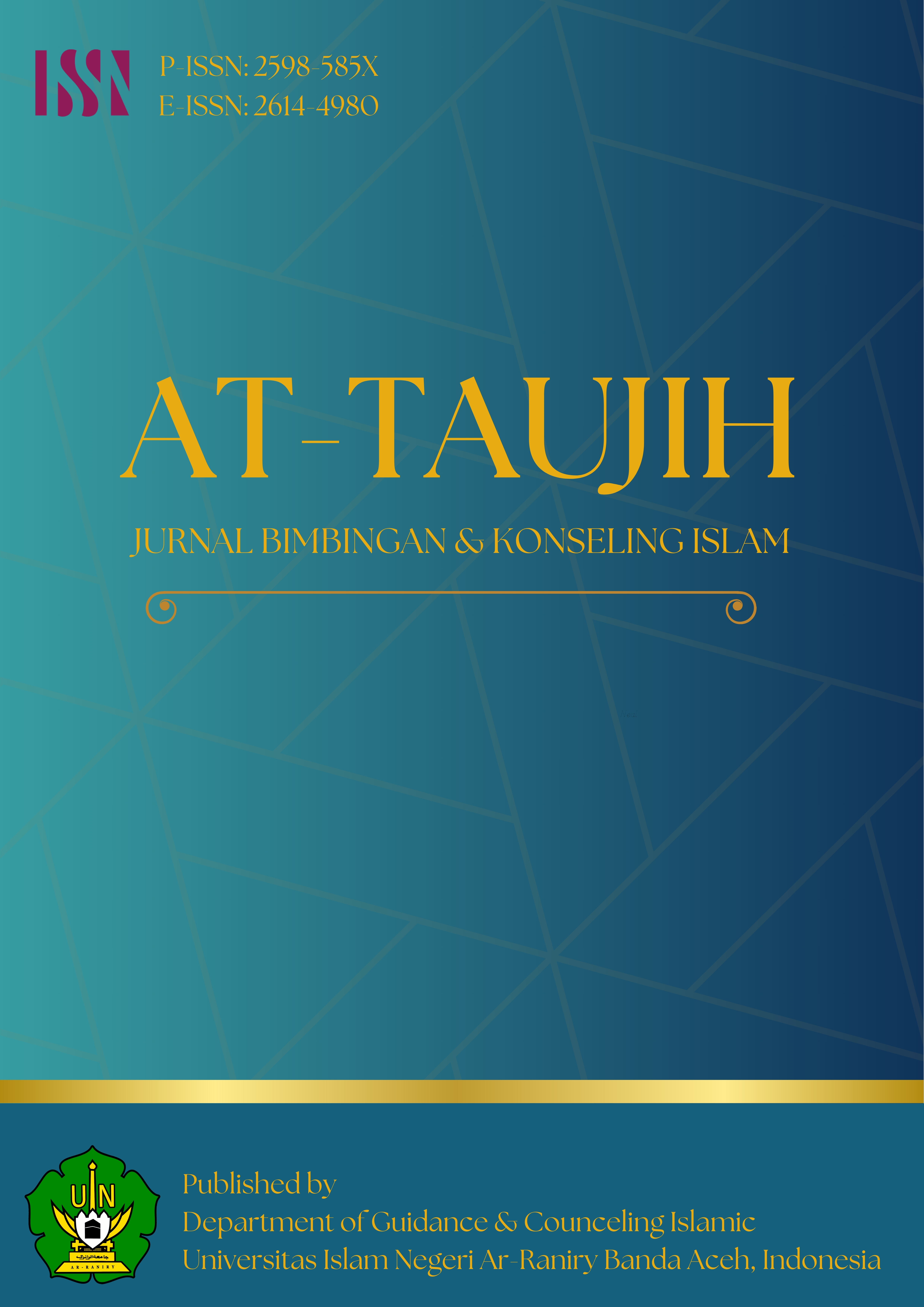IMPLEMENTASI ZIKIR SEBAGAI UPAYA MEREDUKSI CEMAS MELALUI PENDEKATAN COGNITIVE BEHAVIORAL THERAPY (CBT)
DOI:
https://doi.org/10.22373/taujih.v7i1.18757Keywords:
Cognitive Behavioral Therapy, Zikir, KecemasanAbstract
This study aims to explain and analyze the implementation of dhikr as an effort to reduce anxiety through the Cognitive Behavioral Therapy (CBT) approach. Zikr, as a spiritual practice in the Islamic religion, has the potential to influence the thoughts, emotions and behavior of individuals. The CBT approach, which focuses on the relationship between thoughts, emotions and behavior, can be used to understand and harness the potential of dhikr in overcoming anxiety. This study involved a literature review to gather information and in-depth understanding of dhikr, CBT, and the relationship between the two in reducing anxiety. The results of this study indicate that Dhikr also helps change unhealthy thought patterns or cognitive distortions that cause anxiety, as well as provides a sense of calm and inner peace. The integration between dhikr and CBT provides a holistic approach in reducing anxiety by diverting attention, restructuring thought patterns, and creating a feeling of peace.
References
DAFTAR PUSTAKA
Adriansyah, M. A., Rahayu, D., & Prastika, N. D. (2015). Pengaruh Terapi Berpikir Positif, Cognitive Behavior Therapy (CBT), Mengelola Hidup dan Merencanakan Masa Depan (MHMMD) terhadap Penurunan Kecemasan Karir pada Mahasiswa Universitas Mulawarman. Psikoislamika: Jurnal Psikologi dan Psikologi Islam, 12(2), 41-50.
Amri, M. F. Y. (2023). Mengelola Emosi untuk Sukses dan Kesejahteraan. Laporan Kerja Praktek Mahasiswa Teknik, 1(6).
Aris, M. (2019). Perbandingan Efektivitas Relaksasi Benson dan Terapi Zikir terhadap Perubahan Kecemasan pada Lansia di PSTW Gau Mabaji Gowa (Doctoral dissertation, Universitas Islam Negeri Alauddin Makassar).
Bachri, B. S. (2010). Meyakinkan validitas data melalui triangulasi pada penelitian kualitatif. Jurnal teknologi pendidikan, 10(1), 46-62.
Fatmawati, F. (2021). Pengaruh Pengembangan Aplikasi Cognitive Behaviour Therapy Plus Zikir Terhadap Pengendalian Depresi Dan Kadar Glukosa Penderita DM (Doctoral dissertation, Universitas Hasanuddin).
Handayani, R., Batubara, S., Dewi, R., Purwandari, E. S., Diah, H. T., Resmi, D. C., ... & Nugraheni, N. (2021). Terapi Komplementer dalam Kehamilan Mind and Body Therapy.
https://www.kompas.id/baca/humaniora/2023/02/01/cita-cita-indonesia-2045-terhalang-masalah-kesehatan-mental-remaja#:~:text=Menurut%20Indonesia%2DNational%20Adolescent%20Mental,konseling%2C%20baik%20emosi%20maupun%20perilaku. Diakses pada 20 Juni 2023 Pukul 22.21 WIB.
Irhas, W. (2020). Konseling individu melalui tehnik hipnoterapy dan terapy zikir untuk mengatasi trauma pada mahasiswa BKI: studi pada labolatorium konseling Al Tazkiyah UIN Mataram (Doctoral dissertation, UIN Mataram).
Jariyah, A. (2019). Konseling Islam melalui Cognitive Behavior Therapy untuk menangani trauma seorang snak korban pelecehan seksual fisik di Lembaga Perlindungan Anak Jawa Timur (Doctoral dissertation, UIN Sunan Ampel Surabaya).
Junaidi, L. (2007). The Power of Wirid: Rahasia dan Khasiat Zikir Setelah Shalat untuk Kedamaian Jiwa dan Kebugaran Raga. Hikmah.
Khuzaemah, E., Uswati, T. S., Maufur, S., & Nuryanto, T. (2016). Kolaborasi Pendekatan Saintifik dan Sufistik dalam Pembelajaran Menulis dan Memerankan Naskah Drama untuk Membina Sikap Spiritual Siswa: Penelitian Deskriptif Kualitatif di Madrasah Aliyah Negeri (Man) I Cirebon.
Pratama, L. W. (2017). Hubungan Activity Daily Living Non Vokasional Dengan Tingkat Kecemasan Lansia Di Uptd Pslu Pasuruan (Doctoral dissertation, University of Muhammadiyah Malang).
Purnamarini, D. P. A. (2016). Pengaruh terapi expressive writing terhadap penurunan kecemasan saat ujian sekolah (Studi kuasi eksperimen terhadap siswa Kelas XI di SMA Negeri 59 Jakarta) (Doctoral dissertation, UNIVERSITAS NEGERI JAKARTA).
Rahman, H. (2014). Terapi Żikir di Pondok Pesantren Istighfar Tombo Ati Semarang Tahun 2015.
Sari, E. K. (2021). Kesah sebagai teknik meditasi dan zikir dalam persudaraan setia hati terate (PSHT) (Doctoral dissertation, UIN Sunan Ampel Surabaya).
Siregar, E. Y. (2013). Penerapan cognitive behavior therapy (cbt) terhadap pengurangan durasi bermain games pada individu yang mengalami games addiction. Jurnal Psikologi, 9(1), 17-24.
Sugiyono, D. (2013). Metode penelitian pendidikan pendekatan kuantitatif, kualitatif dan R&D.
Togala, W. O. Y. (2021). Intervensi Terapi Zikir pada Pasien dengan Masalah Halusinasi Pendengaran: Studi Kasus (Doctoral dissertation, Universitas Islam Negeri Alauddin Makassar).




